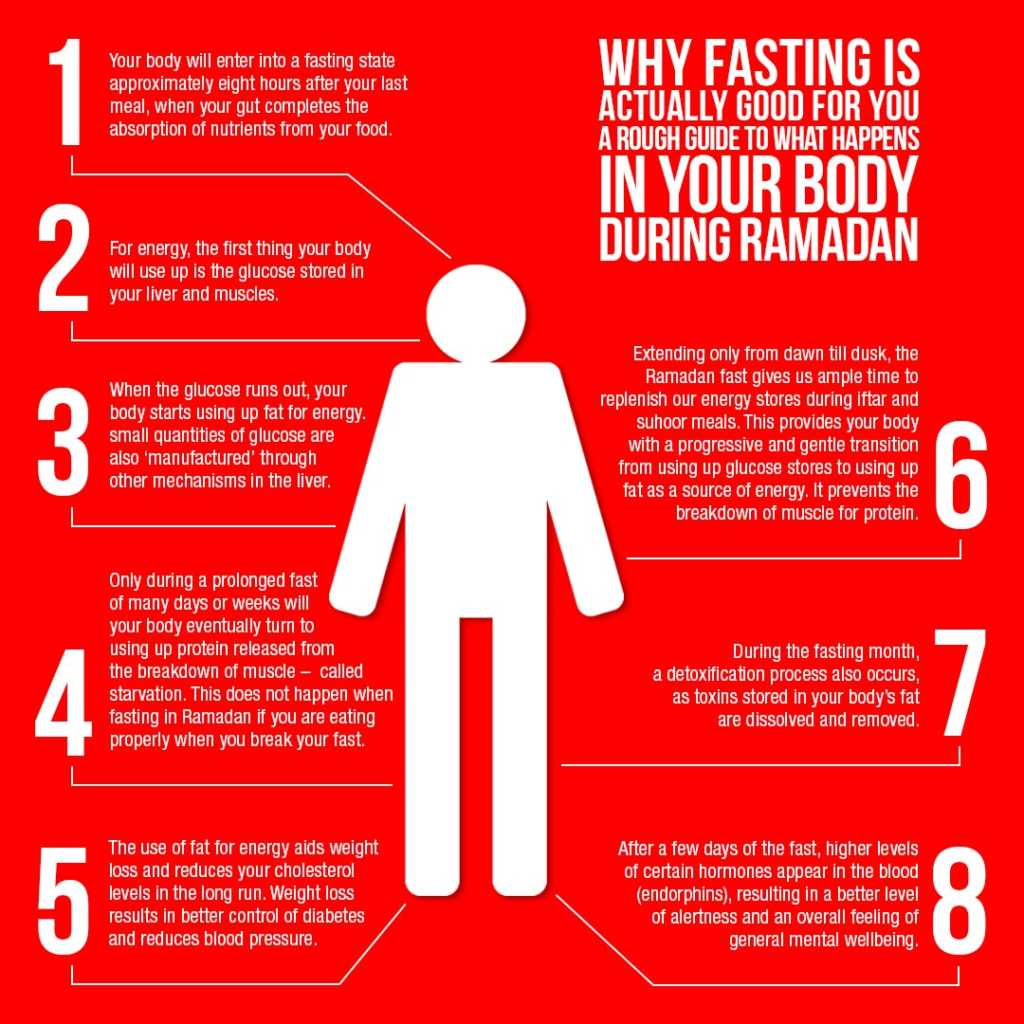As the crescent moon graces the night sky, millions around the world prepare for a month-long spiritual journey known as Ramadan. Beyond its religious significance, Ramadan fasting has captivated the curiosity of health enthusiasts and researchers alike. What are the health benefits and challenges of Ramadan fasting, and how does it impact the body and mind? Let’s embark on a journey to unravel the mysteries surrounding this ancient tradition!
The Health Benefits

1. Metabolic Reset:
During Ramadan fasting, the body undergoes a remarkable metabolic shift. With the absence of food intake during daylight hours, the body taps into its glycogen stores for energy. This metabolic switch triggers various cellular repair processes, promoting detoxification and rejuvenation.
2. Weight Management:
For those seeking to shed some extra pounds, Ramadan fasting offers a natural solution. The restricted eating window helps regulate calorie intake, making it easier to maintain a healthy weight. Additionally, fasting stimulates the production of hormones like growth hormone, which aids in fat burning and muscle preservation.
3. Improved Insulin Sensitivity:
One of the most significant health benefits of Ramadan fasting is its positive impact on insulin sensitivity. As the body adapts to prolonged fasting periods, insulin sensitivity improves, lowering the risk of type 2 diabetes and metabolic disorders. This enhanced sensitivity ensures better blood sugar control and reduces insulin resistance.
4. Enhanced Brain Function:
Contrary to common misconceptions, fasting can sharpen cognitive function and boost brain health. Studies have shown that intermittent fasting, such as Ramadan fasting, stimulates the production of brain-derived neurotrophic factor (BDNF), a protein that supports neuronal growth and connectivity. This increase in BDNF levels enhances cognitive function, memory, and mood.
5. Spiritual Well-being:
Beyond its physical benefits, Ramadan fasting nurtures spiritual well-being. The discipline and self-control required during fasting cultivate a sense of inner peace, gratitude, and mindfulness. Moreover, communal prayers and acts of charity foster a deeper connection with others and strengthen social bonds within the community.
The Challenges

1. Dehydration:
With the long hours of fasting, dehydration emerges as a primary concern during Ramadan. Without adequate fluid intake, especially in regions with high temperatures, fasting individuals may experience symptoms like thirst, fatigue, and headaches. It’s crucial to stay hydrated during non-fasting hours and consume water-rich foods to prevent dehydration.
2. Nutritional Imbalance:
Maintaining a balanced diet can be challenging during Ramadan, leading to nutritional deficiencies. The limited eating window may tempt individuals to indulge in high-calorie, processed foods that lack essential nutrients. To overcome this challenge, prioritize whole foods rich in vitamins, minerals, and fiber, and avoid excessive consumption of sugary or fatty treats.
3. Disrupted Sleep Patterns:
The altered eating and sleeping schedules during Ramadan can disrupt circadian rhythms and lead to sleep disturbances. Many individuals may experience insomnia or daytime drowsiness due to irregular meal times and late-night prayers. Establishing a consistent sleep routine, practicing relaxation techniques, and avoiding caffeine can help mitigate these challenges.
4. Muscle Loss:
Prolonged fasting periods may increase the risk of muscle loss, especially in individuals who do not maintain an adequate protein intake. Without sufficient protein to support muscle repair and growth, the body may break down muscle tissue for energy. To preserve muscle mass during Ramadan fasting, prioritize protein-rich foods such as lean meats, legumes, and dairy products.
5. Mental Fatigue:
The mental fortitude required to abstain from food and water for extended periods can lead to mental fatigue and decreased productivity. Fasting individuals may experience difficulty concentrating, irritability, or mood swings, particularly towards the end of the day. Engaging in light physical activity, practicing mindfulness, and taking short breaks can help alleviate mental fatigue and boost focus.
FAQs
Q1: Can I exercise during Ramadan fasting?
A1: Yes, moderate exercise is encouraged during Ramadan, preferably during non-fasting hours. However, avoid intense workouts that may cause excessive fatigue or dehydration. Opt for low-impact activities like walking, yoga, or light jogging to stay active while fasting.
Q2: How can I stay hydrated while fasting?
A2: Focus on hydrating fluids such as water, herbal teas, and electrolyte-rich beverages during non-fasting hours. Additionally, consume hydrating foods like fruits, vegetables, and soups to maintain optimal hydration levels throughout the day.
Q3: Is it safe to fast during pregnancy or while breastfeeding?
A3: Pregnant or breastfeeding women, as well as individuals with certain medical conditions, should consult with a healthcare professional before fasting. In some cases, fasting may pose risks to maternal and fetal health, and alternative arrangements may be recommended.
Conclusion
In conclusion, the health benefits and challenges of Ramadan fasting are intertwined, offering a holistic perspective on physical and mental well-being. From metabolic reset and weight management to spiritual enrichment and mental resilience, Ramadan fasting encompasses a myriad of effects on the body and mind. By understanding these benefits and challenges, individuals can navigate the fasting period with mindfulness, moderation, and self-care, ensuring a fulfilling Ramadan experience. So, what are the health benefits and challenges of Ramadan fasting? It’s a journey of self-discovery, resilience, and transformation!


